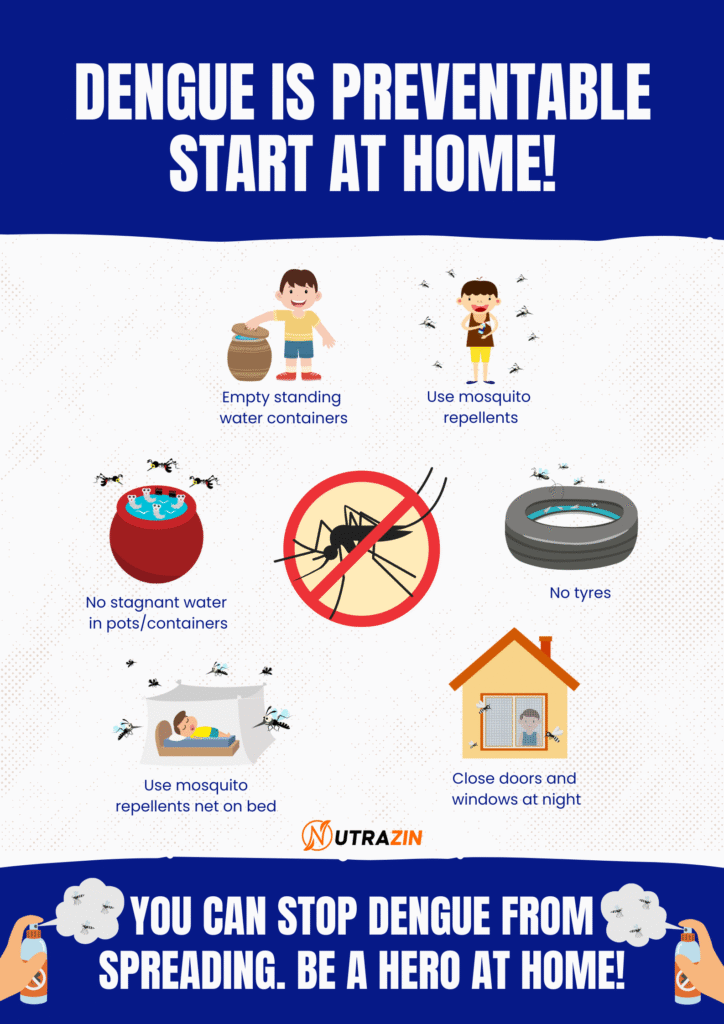
Dengue is a viral infection transmitted by the Aedes mosquito, which thrives in stagnant water and urban areas. With increasing cases globally, especially in tropical and subtropical regions, it’s crucial to be aware of dengue, its symptoms, and preventive measures.
What is Dengue?
Dengue is caused by the Dengue virus (DENV), which has four different serotypes (DENV-1, DENV-2, DENV-3, DENV-4). Infection can result in dengue fever, severe dengue (hemorrhagic fever), or dengue shock syndrome, which can be life-threatening if not treated timely.
Key facts about dengue:
- Incubation period: 4–10 days after mosquito bite
- Not contagious directly from person to person
- Most cases are mild, but severe dengue requires hospitalization
How Dengue Spreads
Dengue spreads through the bite of infected female Aedes mosquitoes, mainly Aedes aegypti and Aedes albopictus. These mosquitoes are day-biting and breed in stagnant water around homes, such as:
- Flower pots and vases
- Water storage containers
- Old tires and unused buckets
- Gutters and drainage
Example: A single water-filled bottle left on a balcony for a few days can become a breeding site for Aedes mosquitoes, increasing the risk of dengue transmission.
Symptoms of Dengue
Dengue symptoms usually appear 4–10 days after infection and can include:
- High fever (104°F / 40°C)
- Severe headache
- Pain behind the eyes
- Muscle and joint pain (often called “breakbone fever”)
- Nausea and vomiting
- Skin rash (appears 3–4 days after fever starts)
- Mild bleeding (nosebleed, gum bleeding)
Severe dengue symptoms (require immediate medical attention):
- Persistent vomiting
- Severe abdominal pain
- Bleeding under the skin
- Difficulty breathing
- Fatigue and restlessness

Prevention: How to Stop Dengue at Home
The best defense is prevention, which involves eliminating mosquito breeding sites and protecting yourself from bites.
Home Prevention Tips
- Remove stagnant water: Empty containers, flower pots, trays, and buckets regularly.
- Clean water storage: Use lids or mosquito nets on water tanks.
- Use mosquito repellents: Creams, sprays, or natural repellents like citronella.
- Install screens: Mesh windows and doors to prevent mosquitoes entering indoors.
- Wear protective clothing: Long sleeves and pants, especially during daytime.
- Use mosquito nets: Even during the day in high-risk areas.
Example: Families in dengue-prone areas often dedicate 10–15 minutes daily to check their homes for standing water, significantly reducing mosquito breeding.
Diet and Foods to Eat if You Have Dengue
While there’s no specific medicine for dengue, proper nutrition helps recover faster, boost immunity, and increase white blood cells (WBC).
Foods to Boost Immunity & WBC
- Papaya Leaf Juice: Known to naturally increase platelet count.
- Citrus Fruits: Oranges, lemons, and grapefruits rich in Vitamin C.
- Pomegranate & Berries: Rich in antioxidants, Vitamin C, and iron.
- Leafy Greens: Spinach, kale, and fenugreek for minerals like iron and magnesium.
- Garlic & Ginger: Anti-inflammatory and immunity-boosting properties.
- Nuts & Seeds: Almonds, walnuts, pumpkin seeds, Vitamin E & zinc.
- Turmeric Milk: Anti-inflammatory and antioxidant-rich.
Hydration is Key
- Drink plenty of water, coconut water, fresh fruit juices, and broths to avoid dehydration.
Superfoods for Dengue Recovery
- Spirulina: Rich in protein, vitamins, and minerals to support immunity.
- Moringa Leaves: Loaded with Vitamin A, C, and calcium.
- Cocoa / Dark Chocolate (unsweetened): Improves blood circulation and immunity.
Dietary Supplements
- Vitamin C & D: Boost immune response.
- Zinc & Selenium: Important for WBC function.
- Multivitamins: Ensure overall nutrient support.
Example: A patient recovering from dengue can drink papaya leaf juice every morning, eat a spinach and pomegranate salad for lunch, and have turmeric milk at night to enhance recovery.
Additional Tips During Dengue
- Rest and sleep: Essential for recovery.
- Avoid oily, processed, and junk foods: Digestion slows down immunity.
- Monitor platelet count regularly: Especially in severe cases.
- Stay hydrated: Oral rehydration solutions (ORS) can help prevent complications.
- Avoid self-medicating with painkillers: Especially NSAIDs like aspirin, which can worsen bleeding.
Key Takeaways
- Dengue is preventable check homes for mosquito breeding.
- Early detection of symptoms and proper medical care is crucial.
- Nutrition plays a huge role; fruits, vegetables, superfoods, and supplements help boost immunity and aid recovery.
- Stay hydrated, get plenty of rest, and follow doctor’s advice.




